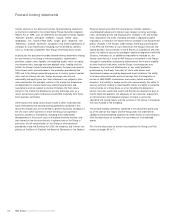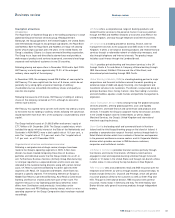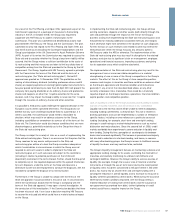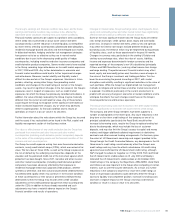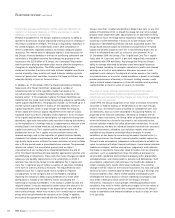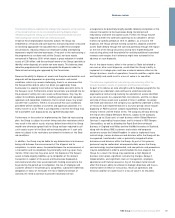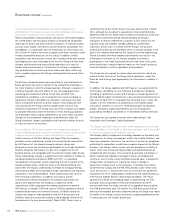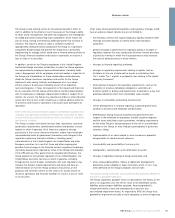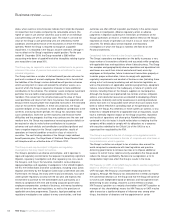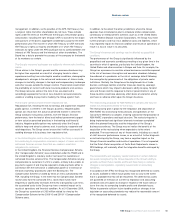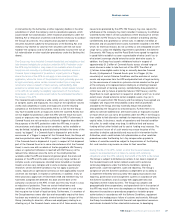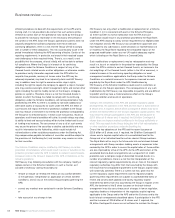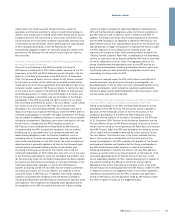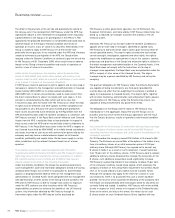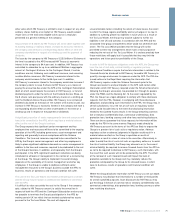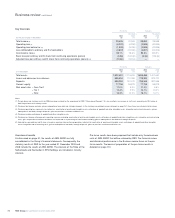RBS 2009 Annual Report Download - page 64
Download and view the complete annual report
Please find page 64 of the 2009 RBS annual report below. You can navigate through the pages in the report by either clicking on the pages listed below, or by using the keyword search tool below to find specific information within the annual report.RBS Group Annual Report and Accounts 200962
The Group operates in markets that are highly competitive and
consolidating. If the Group is unable to perform effectively, its business
and results of operations will be adversely affected.
Recent consolidation among banking institutions in the United Kingdom,
the United States and throughout Europe is changing the competitive
landscape for banks and other financial institutions. If financial markets
continue to be volatile, more banks may be forced to consolidate. This
consolidation, in combination with the introduction of new entrants into
the US and UK markets from other European and Asian countries, could
increase competitive pressures on the Group. In addition, certain
competitors may have access to lower cost funding and be able to offer
retail deposits on more favourable terms than the Group and may have
stronger multi-channel and more efficient operations as a result of
greater historical investments. Furthermore, the Group’s competitors
may be better able to attract and retain clients and talent, which may
have a negative impact on the Group’s relative performance and future
prospects.
Furthermore, increased government ownership of, and involvement in,
banks generally may have an impact on the competitive landscape in
the major markets in which the Group operates. Although, at present, it
is difficult to predict what the effects of this increased government
ownership and involvement will be or how they will differ from
jurisdiction to jurisdiction, such involvement may cause the Group to
experience stronger competition for corporate, institutional and retail
clients and greater pressure on profit margins. Future disposals and
restructurings by the Group and the compensation structure and
restrictions imposed on the Group may also have an impact on its ability
to compete effectively. Since the markets in which the Group operates
are expected to remain highly competitive in all areas, these and other
changes to the competitive landscape could adversely affect the
Group’s business, margins, profitability and financial condition or result
in a loss of value in its securities.
As a condition to HM Treasury support, the company has agreed to
certain undertakings which may serve to limit the Group’s operations and
it may be required to agree to further restrictions in the future.
Under the terms of the First Placing and Open Offer, the company
provided certain undertakings aimed at ensuring that the subscription
by HM Treasury of the relevant company ordinary shares and
preference shares and the Group’s participation in the Credit Guarantee
Scheme offered by HM Treasury as part of its support for the UK
banking industry are compatible with the common market under EU law.
These undertakings include (i) supporting certain initiatives in relation to
mortgage lending and lending to SMEs until 2011, (ii) regulating
management remuneration and (iii) regulating the rate of growth of the
Group’s balance sheet. Under the terms of the Second Placing and
Open Offer, the Group’s undertakings in relation to mortgage lending
and lending to SMEs were extended to larger commercial and industrial
companies in the United Kingdom. These undertakings may serve to
limit the Group’s operations. In addition, pursuant to certain
arrangements entered into between the company and certain UK
Government departments, the company is subject to further
undertakings, which supersede the lending commitments made to
HM Treasury in October 2008 and January 2009 by agreeing to lend to
creditworthy borrowers on commercial terms, £16 billion above the
amount the company had budgeted to lend to UK businesses and
£9 billion above the amount the company had budgeted to lend to UK
homeowners in the year commencing 1 March 2009. There is also a
commitment to lend at similar levels in the year commencing 1 March
2010, although this is subject to adjustment of the commitments by
agreement with the UK Government to reflect circumstances at the start
of the 2010 commitment period. Notwithstanding the Group’s
willingness to lend to creditworthy customers and its clarity that the
requisite funds are available, thereby fulfilling its commitments,
indications remain that it is unlikely that the Group’s net business
lending will increase by the £16 billion that it is making available, in the
light of the subdued demand that the Group is currently experiencing.
Failure to comply with these lending commitments may result in the
withdrawal or restriction of the Group’s eligibility to extend its
participation in the Credit Guarantee Scheme from three to five years,
which could have a material adverse impact on the Group’s business,
financial condition, results of operations and prospects.
The Group has also agreed to certain other commitments, which are
material for the structure of the Group and its operations, under the
State aid restructuring plan approved by the Commission in relation to
State aid.
In addition, the Group, together with HM Treasury, has agreed with the
Commission a prohibition on the making of discretionary dividends
(including on preference shares and B shares) or coupon payments on
existing hybrid capital instruments for a two-year period commencing no
later than 30 April 2010. It is possible that the Group may, in future, be
subject to further restrictions on payments on such hybrid capital
instruments, whether as a result of undertakings given to regulatory
bodies, changes to capital requirements such as the proposals
published by the Basel Committee on 17 December 2009 or otherwise.
The Group has also agreed to certain other undertakings in the
Acquisition and Contingent Capital Agreement.
The Group could fail to attract or retain senior management, which may
include members of the Board, or other key employees, and it may suffer
if it does not maintain good employee relations.
The Group’s ability to implement its strategy depends on the ability and
experience of its senior management, which may include Directors, and
other key employees. The loss of the services of certain key employees,
particularly to competitors, could have a negative impact on the Group’s
business. The Group’s future success will also depend on its ability to
attract, retain and remunerate highly skilled and qualified personnel
competitively with its peers. This cannot be guaranteed, particularly in
light of heightened regulatory oversight of banks and heightened
scrutiny of, and (in some cases) restrictions placed upon, management
compensation arrangements, in particular those in receipt of
government funding (such as the company). The Group has made a
commitment to comply with the FSA Remuneration Code. These rules
came into force on 1 January 2010 and are in line with the agreement
reached by the G-20, setting global standards for the implementation of
the Financial Stability Board’s remuneration principles. The Group
agreed that it will be at the leading edge of implementing the G-20
principles and has granted UK Financial Investments Ltd (UKFI)
consent rights over the shape and size of its aggregate bonus pool for
the 2009 performance year. The level of the 2009 bonus pool and the
deferral and clawback provisions implemented by the Group may impair
the ability of the Group to attract and retain suitably qualified personnel
in various parts of the Group’s businesses.
Business review continued


